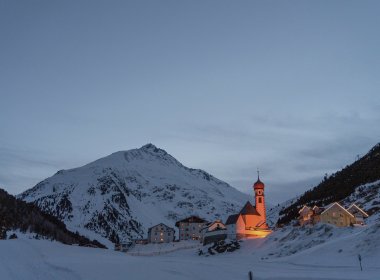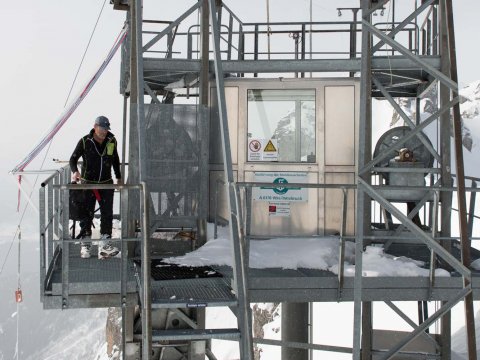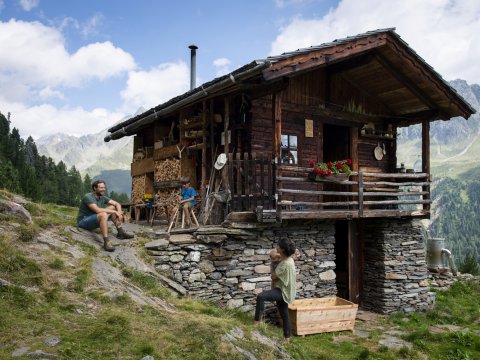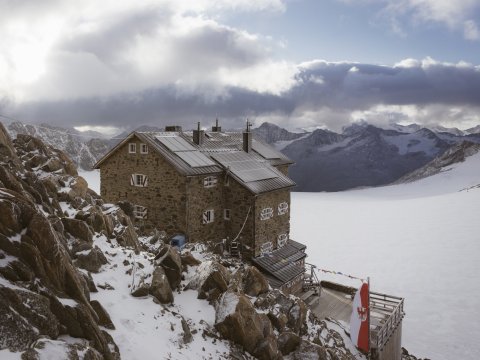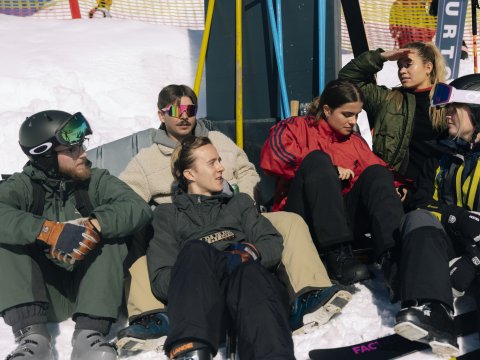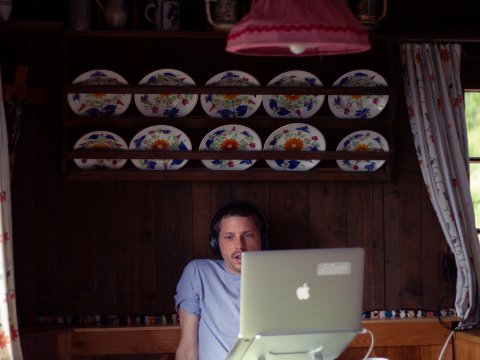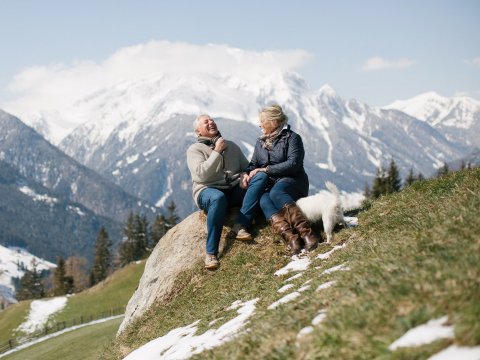Starting All Over Again
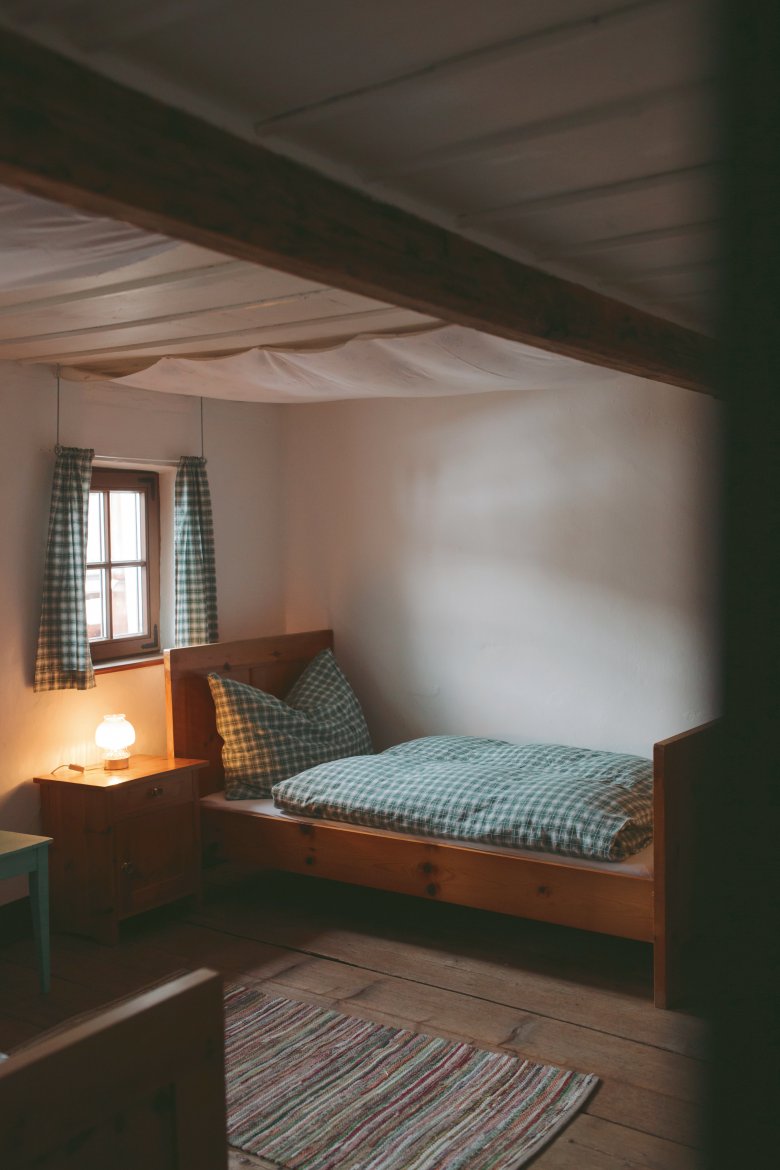
Of course, Georg Gasteiger could have bought a new coat rack. Maybe a designer one. One crafted from exquisite materials. Instead he decided to make do with a plank of wood and a few basic hooks. The screws holding it to the wall are coming away, hastily replaced by a piece of wire. Shabby chic? „Whatever. That’s just the way I like it,“ Georg says with a smile.
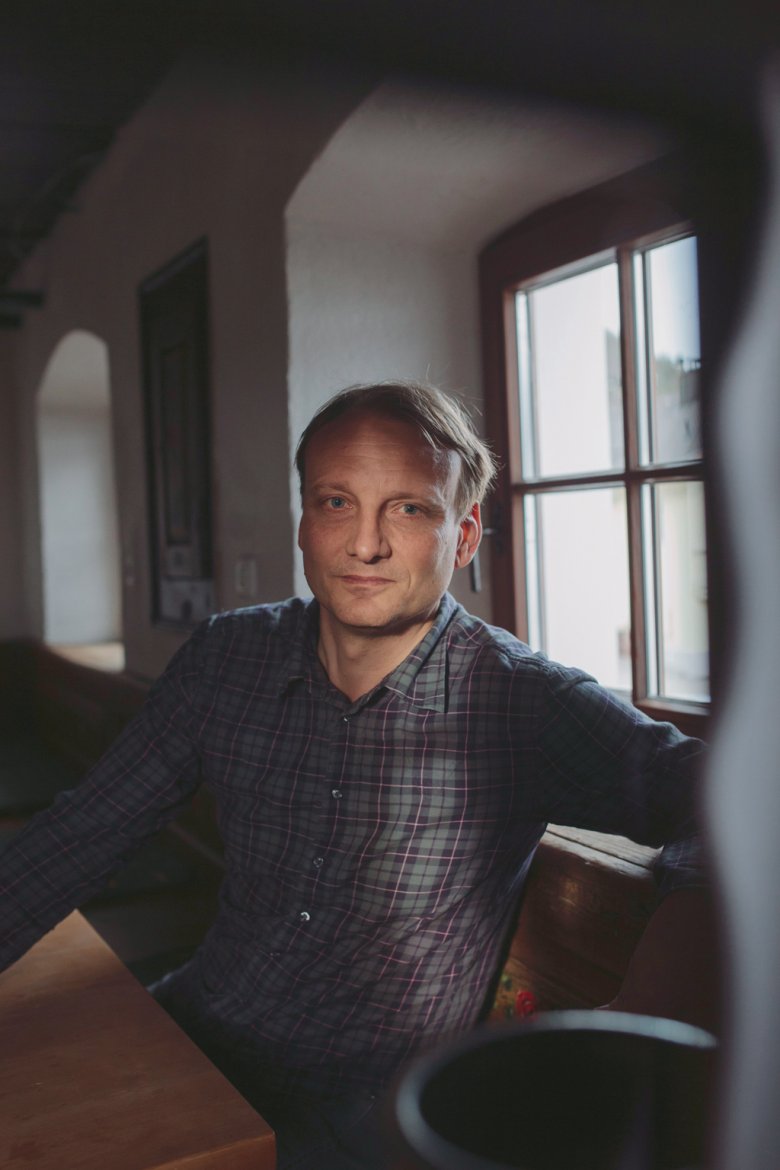
Eight years have passed since Georg bought the Mesnerhof in Steinberg am Rofan. He spent many months renovating the old farmhouse, but it still retains the same authentic charm with wobbly chairs dotted around the house and paint peeling off the thick walls. At the heart of the large kitchen stands an old wood-fired stove.
Georg Gasteiger enjoys the simple things in life. The last thing he wanted was to turn this ancient farmstead into a luxurious five-star chalet. Instead the former banker decided to realise his vision of a community retreat. „First and foremost I wanted to share this place with other people,“ says Gasteiger. „Here at the Mesnerhof everything happens a little more slowly.“ Outside, snow-covered meadows and forests give way to the craggy peaks of the Rofan Mountains set against a cobalt blue sky. Not a sound is to be heard.
We don’t try to plan everything down to the last detail.“ Georg Gasteiger
For ten years Georg Gasteiger was Head of Creativity and Innovation at the Austrian Development Bank. There he was responsible for evaluating projects, processing applications and realising the dreams of others. Finally he decided it was time for a change – time to make his own dream come true. „I wanted to go back to my country roots,“ explains 54 year-old, who spent his childhood growing up on a farm in the Inn Valley. „I was done with endless meetings, pointless papers, reporting to superiors, always having to always think about lots of different people and their interests.“ Gasteiger speaks in short, clear sentences. Years of PR training have left their trace. At the same time he is relaxed, drifting off every now and then as he gazes out of the window. Does he feel more at home in the city or the countryside, I ask. „Both,“ he replies. „I don’t want to have to decide.“
It was his father who originally bought the Mesnerhof from a pair of brothers, neither of whom had children to take over the farm. His first idea was to tear it all down and start again, but Georg was vehemently against the idea. „Getting rid of such an old and historic building would have been a crime,“ he says looking back. „Instead, I thought about how I could combine rural traditions with urban living.“

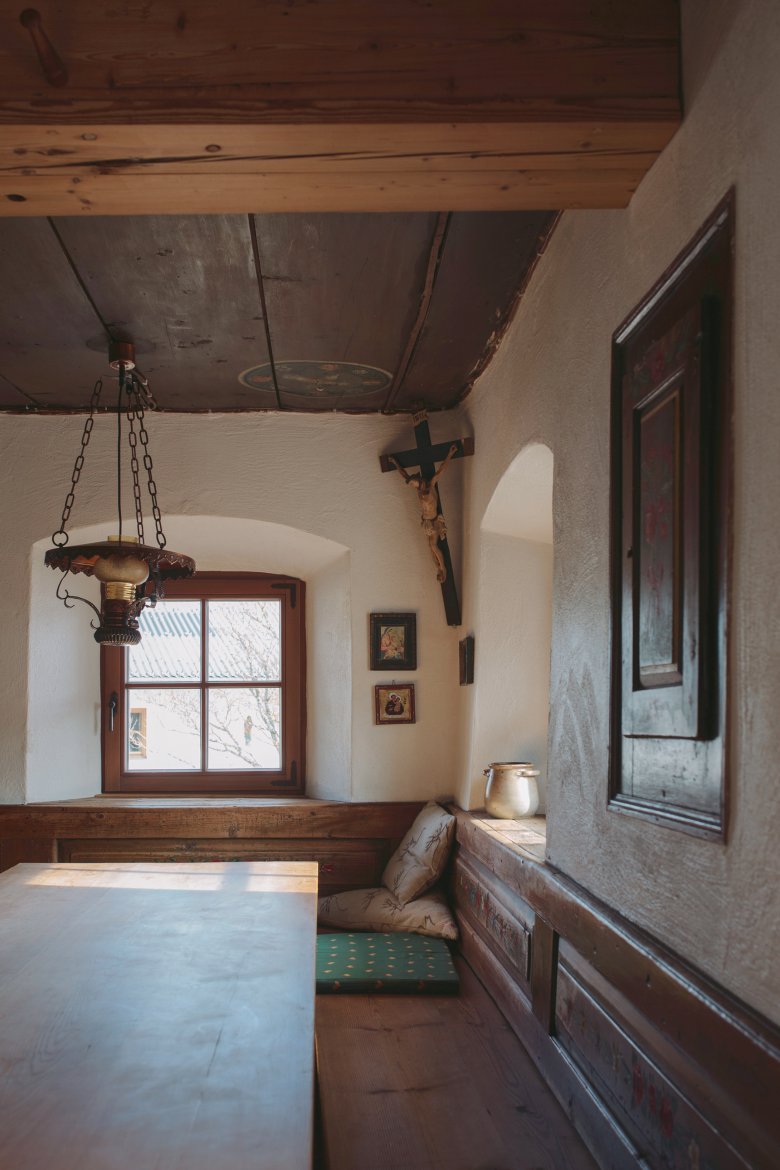
The result is the „Mesnerhof-C“, an alternative hotel where the „C“ in the name stands for „creation“, „communication“ and „concentration“, but also for „community“, „chalet“ and „camp“. It is a place for people who prefer the simple life and would rather go without the trappings of five-star hotels. A place for city dwellers whose lives are no longer strictly divided between work and play. A place for people who want to be close to nature but still connected to the outside world. The concept has been a success – the chalets are booked up long in advance.
Over the years Georg has welcomed groups of friends, teams of work colleagues, entire university departments – as well as large families from the United States and the Middle East. A former barn on the site has been transformed with the help of architecture students from Sankt Pölten in Lower Austria into what he calls a „modern interpretation of a dormitory“. The room contains spartan individual sleeping pods referred to as „nests“. The showers are communal. This large barn with plenty of natural light is designed as a retreat where groups can be on their own to enjoy everything from yoga and slacklining to making music together and pottery classes. „Things develop on their own,“ explains Gasteiger. „We don’t try to plan everything down to the last detail.“ Georg likes to try out new things. Sometimes they work, sometimes they don’t. That’s all part of the process. He calls this approach „rapid prototyping“, a term used by designers. It is just one of many English words and phrases which come up in our conversation – a sign that, despite quitting the ratrace, Georg certainly hasn’t turned his back on the world. Indeed, his aim is to combine the best of both lifestyles – rural and urban, traditional and modern.
QUICK PROFILE
Georg Gasteiger grew up on a farm which passed into the hands of his older brother. Gasteiger himself studied in Vienna and worked for the Austrian Development Bank until he decided to start over again and go back to his roots by developing the Mesnerhof-C: „I thought about how to combine rural traditions with urban living.“
The story is similar to that of Christina Mölk. In 2009 the graphic designer from Innsbruck and friends were on the lookout for a studio for their graphic design agency – and a place to hold events. They eventually found a former bakery in the Dreiheiligenstraße near the centre of Innsbruck. The building, which had been empty for many years, had a special meaning for Mölk. It was here that her great-grandmother, Therese Mölk, set up and her own bakery in the 1920s. The flat above the bakery is where her grandparents lived and her father was born. Years later the building was also the headquarters of MPREIS, a large chain of supermarkets in Tirol belonging to Christina Mölk’s family.
„I remember how we went through the old building holding torches and kept finding new spaces everywhere,“ says the 39 year-old. „The rooms were covered a layer of old flour, one of them had a bright red floor, the cellar was just about big enough for me to squeeze into it. It was all a little spooky.“ Spooky it may have been, but Christina and her friends liked what they saw. They decided it would be a real shame to leave such an interesting building full of character unused. (And it was far too big for just a graphic design agency alone.) For years Christina had dreamt of creating an off space, a place bringing together artists and art enthusiasts. Now the time had come to make her dream come true.
One of those who joined her on this journey was Christoph Grud, an architect who specialises in low-cost building techniques. A key part of his concept is „upcycling“ – taking old bits and pieces destined for the scrap heap and giving them a new life. Christina, Christoph and the team built a café and a stage followed by workshops, co-working spaces, a kitchen and seminar rooms. Over time more and more volunteers joined the project. „Everyone was so motivated,“ remembers Mölk. „Innsbruck was crying out for a place like this.“
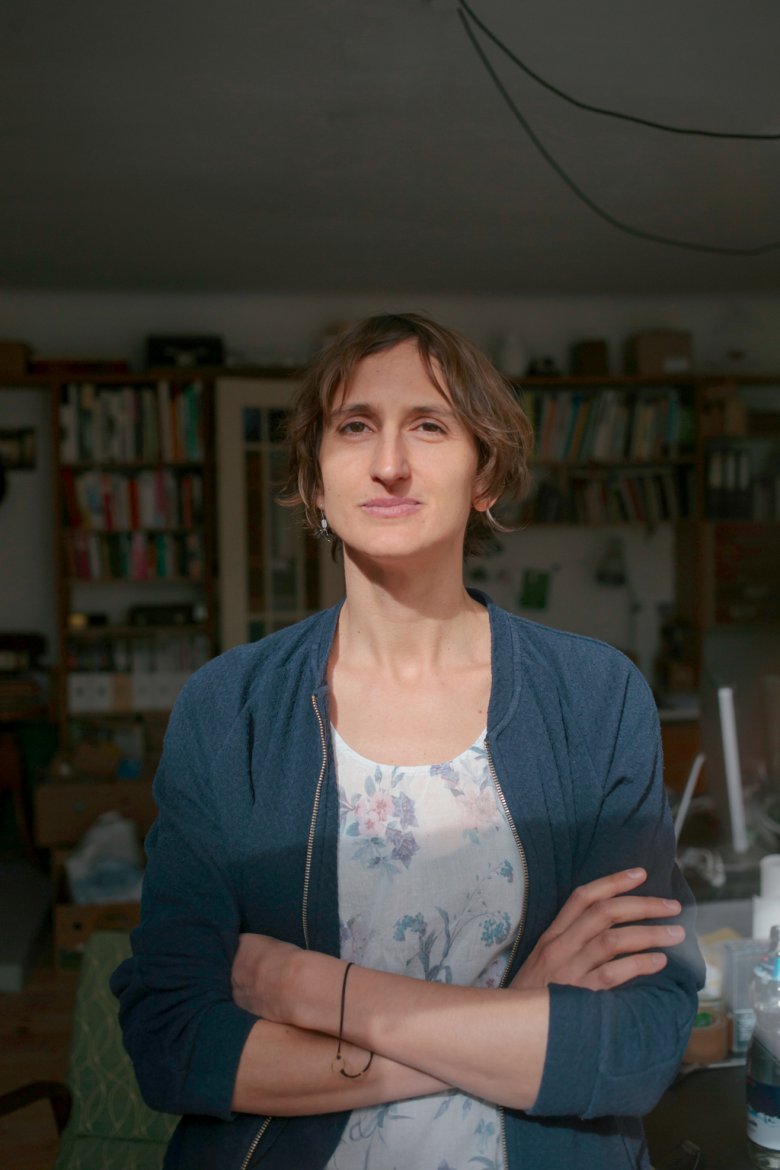
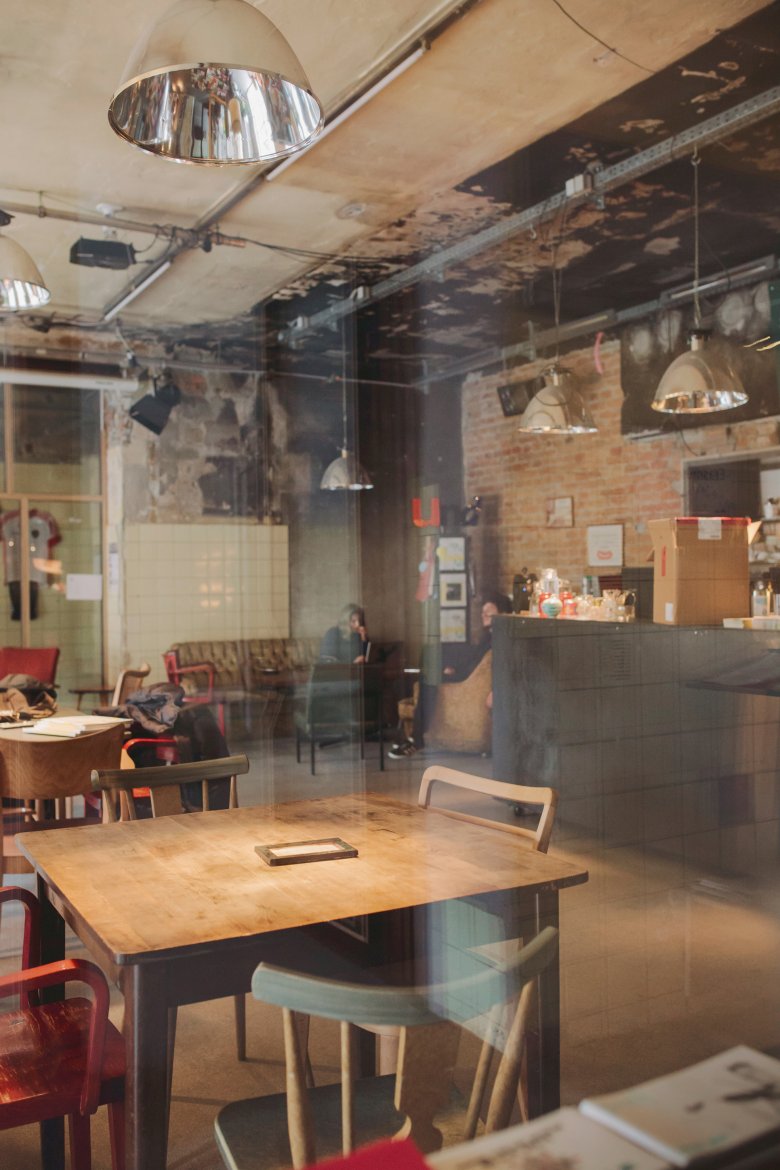
Event centre, culture hub, experiment lab, networking space – it’s hard to put a label on Die Bäckerei. It hosts poetry slams, concerts and exhibitions, while groups and businesses can hire working spaces. There are also regular readings and even bike repair workshops. „Every person who works here is part of the decision-making process,“ explains Mölk. This democratic grassroots approach doesn’t always make things easy, she adds, but for her and her friends Die Bäckerei has now turned into full-time job. None of them are earning a fortune – but that’s not what it’s about.
I never wanted to be one of those people who are always against everything. I wanted to make a constructive contribution of my own.“ Christina Mölk
Mölk’s new job is much more diverse and varied than her old career in graphic design. In our fast-moving world where efficiency and performance dominate, she wants Die Bäckerei to be an oasis of calm. „We want to stay flexible and encourage an anvironment where people can make mistakes,“ explains Mölk. „It’s okay to fail. That’s part of life.“ Over the years Die Bäckerei has given rise to numerous projects. Many of Innsbruck’s residents believe it has been the driving force behind a new upswing in culture and the arts in the city.
It has shown that there is an alternative, a different way of doing things. Similar initiatives have popped up throughout the city such as the „endlich* store“, a place where clothing and handicrafts are made and sold, and „bilding“, an alternative art and architecture school for children and teenagers aged 4-19. „If you start something new it inspires lots of other people to do the same,“ says Mölk. „I never wanted to be one of those people who are always against everything. I wanted to make a constructive contribution of my own.“
QUICK PROFILE
Christina Mölk is the great-granddaughter of Therese Mölk, who in 1920 set up her own convenience store and thereby laid the foundations for what would go on to become the supermarket chain MPREIS. Christina Mölk herself worked as a graphic designer until 2009, when she set up Die Bäckerei, an off space in the building once used by her great-grandmother to bake bread. „We want to stay flexible and encourage an anvironment where people can make mistakes,“ explains Mölk. „It’s okay to fail. That’s part of life.“
A man who has been part of the team at Die Bäckerei and loves Innsbruck’s blossoming creative scene is Oscar Germes Castro. At the tender age of 17 Oscar came from Chihuahua to Tirol, where he studied politics. He then spent ten years working for SOS Children’s Villages in the fields of data collection and quality management. It was an interesting and fulfilling role that even took him to the European Parliament. In his free time he played the drums, organised concerts and made his own video clips – but there was still something missing in his life. As a child he had dreamt of running his own restaurant.
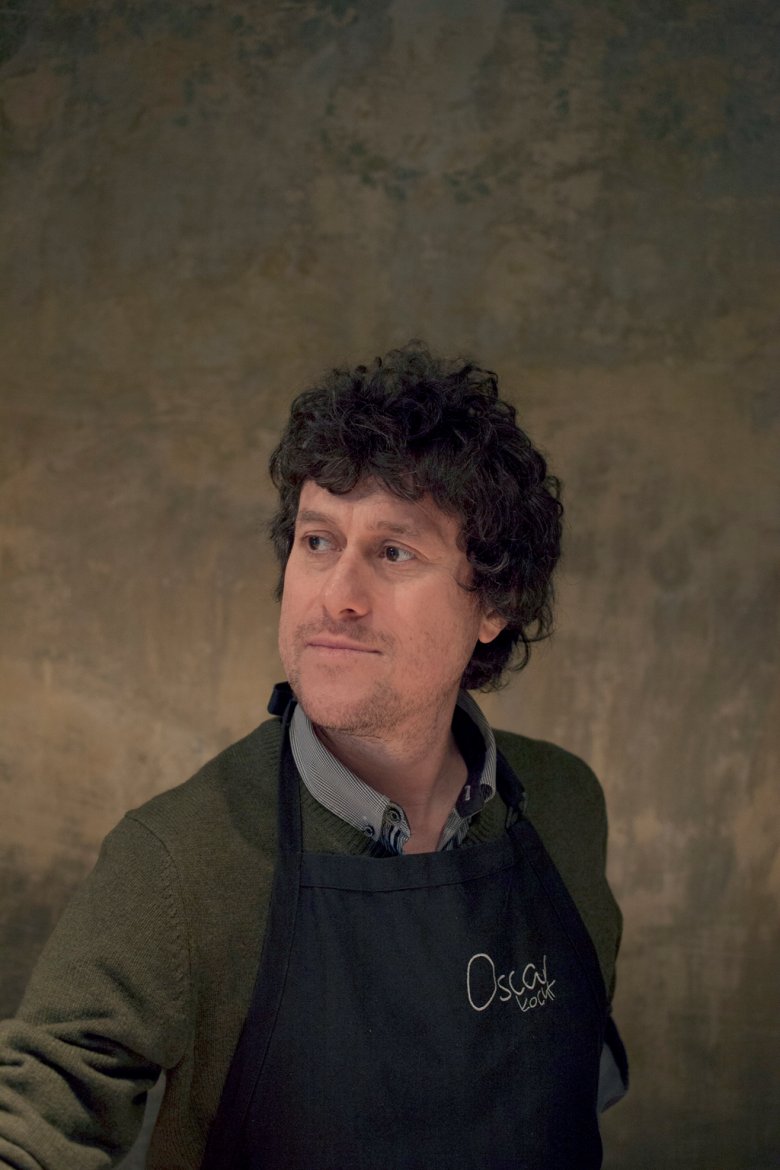
In August 2014 he made this dream a reality by setting up what is almost certainly Austria’s smallest restaurant comprising a bar, a kitchen with two hotplates and a table for 8-10 diners. That’s it. Everyone sits next to each other and eats together. The name, like the restaurant itself, is minimalistic: „Oscar kocht“. This back-to-basics philosophy is also reflected in the food, prepared using a few ingredients of outstanding quality. „I buy good fruit and vegetables,“ smiles the 42 year-old. „There’s not much else you have to do. I just pimp up the food a bit et voilà!“ All the dishes served at his restaurant are vegetarian. Why? „As a student I had very little money and couldn’t afford meat, so I learned to become very creative with vegetarian ingredients.“ His restaurant is still one of very few in Innsbruck committed to a 100% meat-free dining experience.
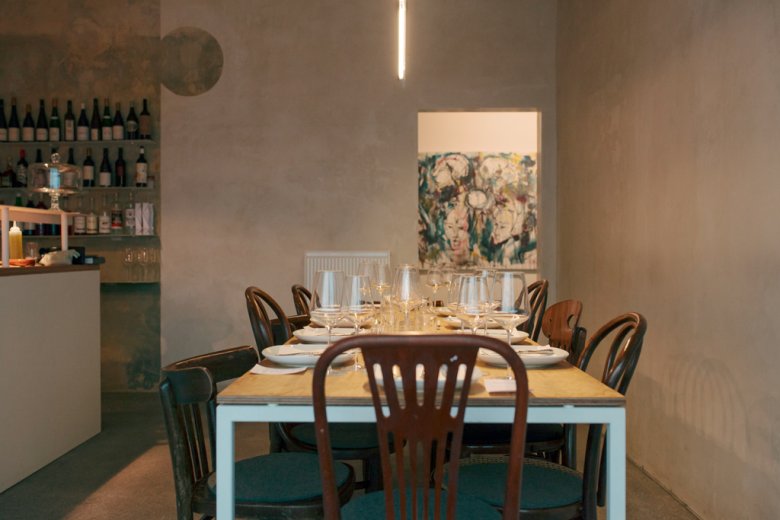
There is no menu to speak of at „Oscar kocht“. Each week is new and different. When I visit he is serving hummus with amarant and avocado, polenta with zucchini and pomegranate or chocolate and poppy seed tarte. All the ingredients are fresh and seasonal, with most sourcd from organic producers in the region. The portions aren’t huge, but Oscar says everyone is welcome to ask for a little more if they are still hungry. This approach, he says, keeps waste to a minimum. „Last year, out of 2,300 covers, I threw away two and a half portions of risotto and two bowls of soup.“

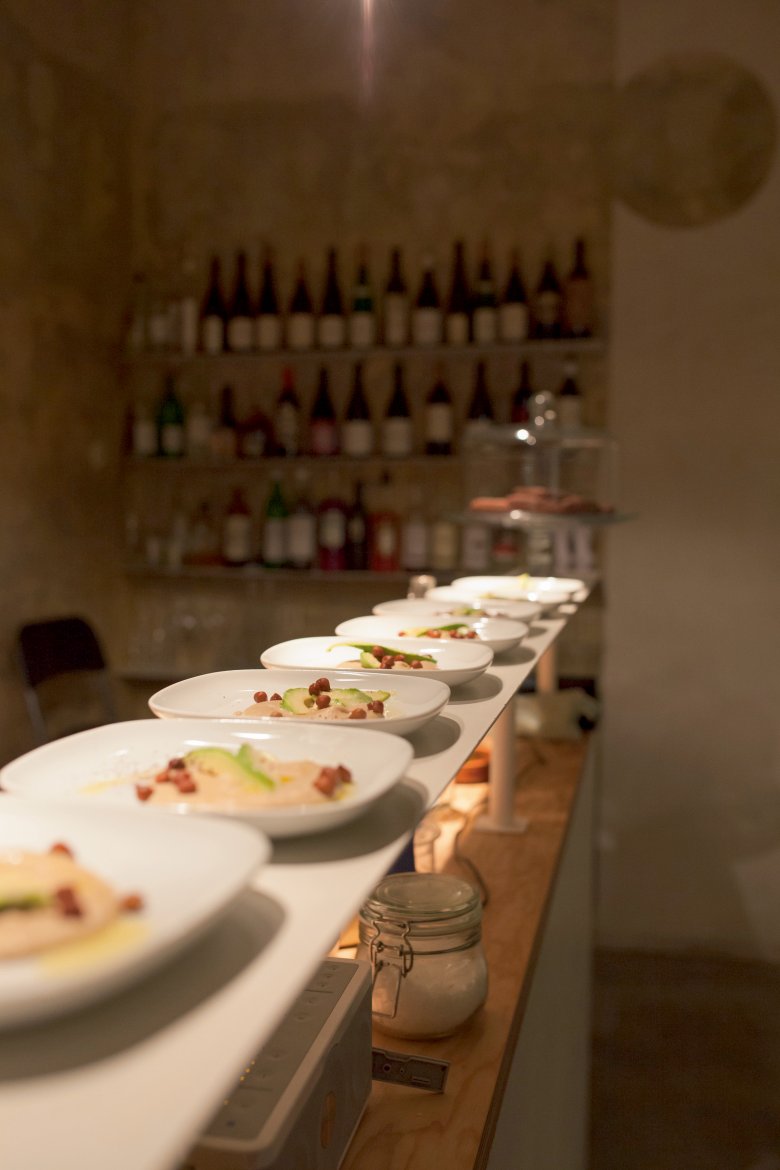
Oscar Germes Castro is more than just a chef – his dishes come with a side helping of politics. „Sometimes I talk a bit too much,“ he says with a wry smile. „I like to share my view of the world with the people who come to my restaurant. We talk about everything from the pollution of the environment to modern consumerist society.“ This fusion of food and philosophy has struck a chord with locals – the restaurant is often booked up weeks in advance.
QUICK PROFILE
Oscar Germes Castro came to Tirol to learn German – and didn’t understand a word. Nobody had told him that there are lots of different dialects in the German-speaking world. Today, however, he has come to love the local dialect – and the local (vegetarian) food. „Here in Tirol, as in many other places, meat was a rare treat not so long ago.“
One of Oscar’s favourite producers is Regula Imhof. Originally from Switzerland, she moved to the village of Natters near Innsbruck many years ago and supplies Oscar with apples, pears, plums, vinegar and juices – all 100% organic, of course. Imhof also decided to switch careers. Until recently she was vice secretary-general of the Alpine Convention, an environmental protection project based in Innsbruck and bringing together countries across the Alps from Slovenia to Monaco. Before that she had run the Liechtenstein Society for Environmental Protection, then been in charge of a development project in the mountains of Central Asia for six years. „I have been fortunate to have an exciting, fulfilling career with many different experiences,“ Regula says. „But there came a point when I wanted to spend more time outdoors instead of in an office.“ The 51 year-old decided to set up her own organic farm near Natters, on a warm and sunny plateau south of Innsbruck.
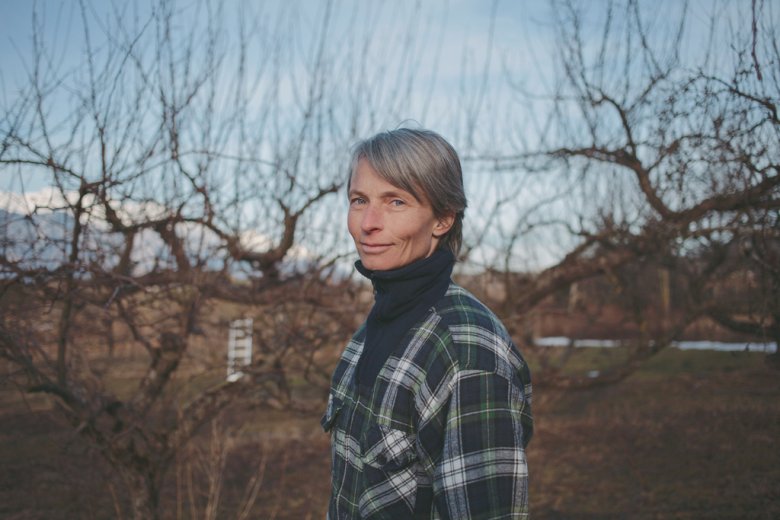
Regula Imhof’s orchard is perched at 1,000 metres above sea level in Raitis. It is one of three areas of land she tends to. The altitude is higher than usually recommended for growing fruit. „Lots of the dairy farmers here are sceptical and wonder why I am wasting the land up here planting pear trees.“ The harvest, however, is good – and the quality of the fruit is outstanding. The soil here is deep and rich in nutrients. „I have never been one who has been put off by what other people think,“ smiles Regular. During the winter months, the 5,000 pear and apple trees are being cut back ready for the next season. In summer her Conference, Alexander and Lucas pears grow alongside Glosteroder Geheimrat Oldenburg apples and dark purple plums, which she often sells fresh or uses for jams. The name of her company? „Gute Frucht“ or „Good Fruit“.
There came a point where I wanted to spend more time outdoors instead of in an office.“ Regula Imhof
Her decision to switch careers wasn’t made on a whim. Regula had prepared everything. In 2011 she started learning about growing fruit. She studied forestry, attended the agricultural university of applied sciences in Vienna and, finally, completed a course in fruit growing. These days she loves spending time out in the field, often with customers keen to see, smell and taste her produce. As we walk she bends down to inspect a young tree whose roots have been gnawed away by rodents. „Mousetraps are the only solution,“ she says with a wry smile. These days she can be found come rain or shine planting, weeding, harvesting and enjoying the great outdoors. A dream come true.
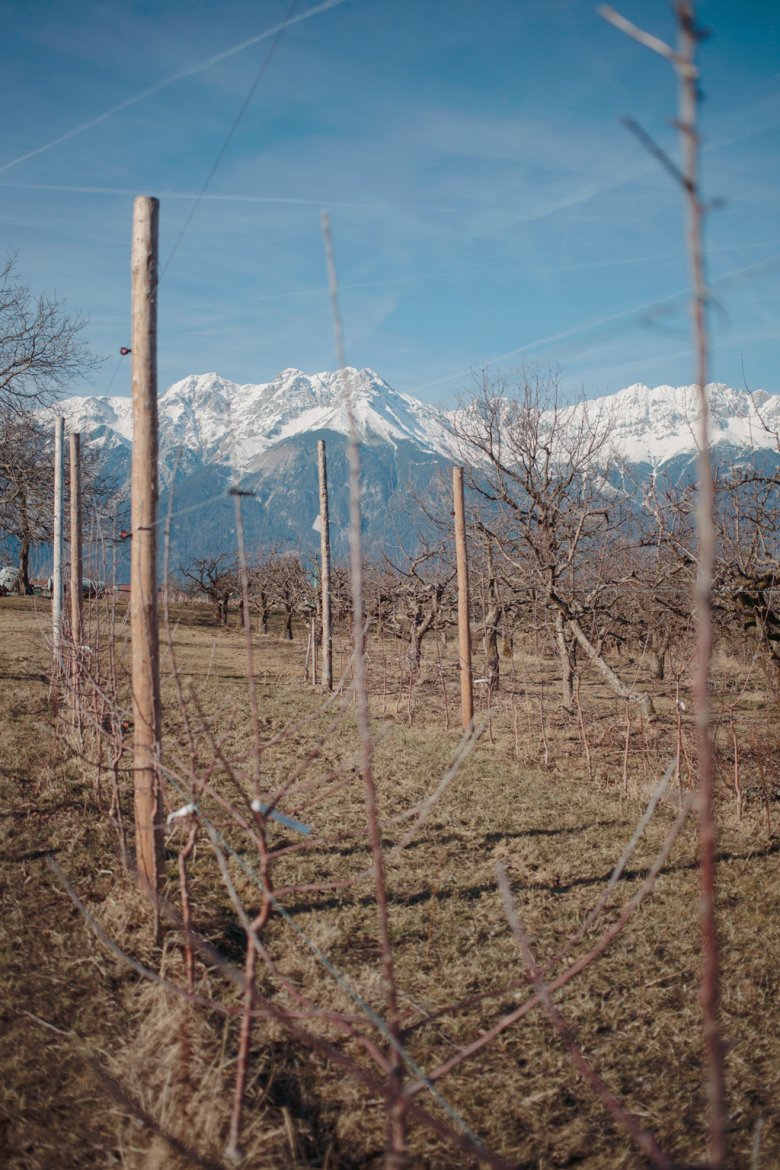
So does she miss her old life? The meetings, the politics? „For me politics is always part of life,“ replies Regula. „This here is also political.“ Her organic philosophy, new understanding of work-life balance, her determination to make her dream come true. We arrive back at the car. The secateurs are placed back in the boot. Enough for today. Time to head home and enjoy a slice of apple tart.
QUICK PROFILE
Regula Imhhof worked in several senior positions in the field of environmental protection before setting up her own fruit farm in 2011. „Politics is always part of life. This here is also political.“










